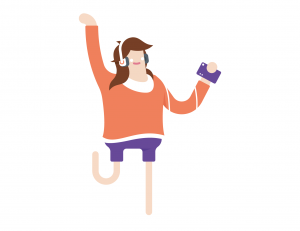Good physical health can increase your resistance to stress
Look after your health to boost mental wellbeing, by increasing energy levels, lifting your mood and helping you stay calm. Read our simple tips for a happier, healthy lifestyle.

Eat Well
A healthy, balanced, nutritious diet can improve energy levels, keeping you more alert and able to cope with stress. Start the day right with a good breakfast.
If you’re feeling anxious or low, avoid sugary snacks – the initial burst of energy they give, will soon be followed by a crash, which generally intensifies negative feelings.
Avoid Unhealthy Habits
Alcohol is often part of socialising and having fun with friends, so just be sensible… don’t drink excessively and try to keep it to a minimum during the week.
Obviously things like smoking and drugs will be harmful to health and wellbeing, so stay away from those.
Relax, Have Fun!
Make time to do things you really enjoy, like socialising, relaxation or exercise.
Certain activities are known to help you unwind:
Listen to Music
The right type of music can have a very relaxing effect on mind and body. There are loads of playlists on YouTube & Spotify for relaxing, or whatever type of music you enjoy.
Get Out
There’s evidence that nature can promote wellbeing, leaving you feeling calmer and more positive.
So take a walk, or just get out and enjoy your natural surroundings.
Get Enough Sleep
Sleep plays a vital role in psychological and physical wellbeing:
🙂 A good night’s sleep helps calm the mind
🙁 Lack of sleep can drastically affect your mood, memory and judgment, increasing stress levels.
Get Some ZEDzzzzzzzz
Stay off Stimulants
Stimulants can disrupt both quantity and quality of sleep – including nicotine, alcohol & caffeine. In fact, research shows that caffeine consumed even 6 hours before bedtime could significantly disrupt sleep. Be aware that watching ‘stressful’ TV programmes at night can also prevent you falling asleep easily.
Log off!
Avoid using electronic devices for a few hours before you go to bed. Smart phones, tablets, computers and flat-screen TVs all emit blue light which keeps you awake by suppressing melatonin, the sleep-inducing hormone.
Jog on!
Taking regular exercise over a sustained period has been shown to benefit sleep – 150 minutes of exercise per week will help you sleep better and feel more alert during the day. But not too late in the evening, unless it’s relaxing, such as yoga or gentle stretching.
Find out more:
eBook/Book: ‘The Complete Guide To A Good Night’s Sleep by Carmel Harrington

Exercise
Apart from the obvious physical benefits, regular exercise has known psychological advantages: when you exercise, your body releases chemicals called endorphins, which trigger a positive feeling. (Nobody said it better than Elle Woods in Legally Blonde… See below)
Exercise helps to clear your head, enabling you to tackle problems more calmly. It also helps you relax, which in turn will improve your sleep.
Being active doesn’t mean you need to go to the gym or take up sport – go for a bike ride, take a walk or try a yoga class. Just find something you enjoy and blend it into your life.
Find out more:
Mind Body Green
Tips, tools and ideas for mental & physical health
How to look after your mental health using exercise – Mental Health Foundation
Explains how exercise benefits mental wellbeing & how to get started
Documentary: ‘The Connection – Mind Your Body’
Change your mind to change your health – the film features stories of people recovering from serious illness & explores the link between mind body & health.
Watch 15 minutes free/buy the film/read the blog

